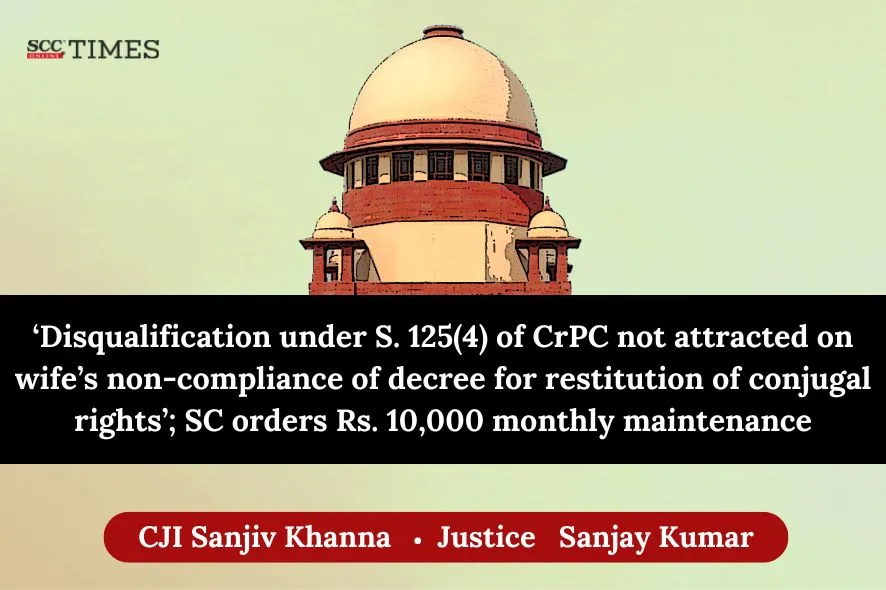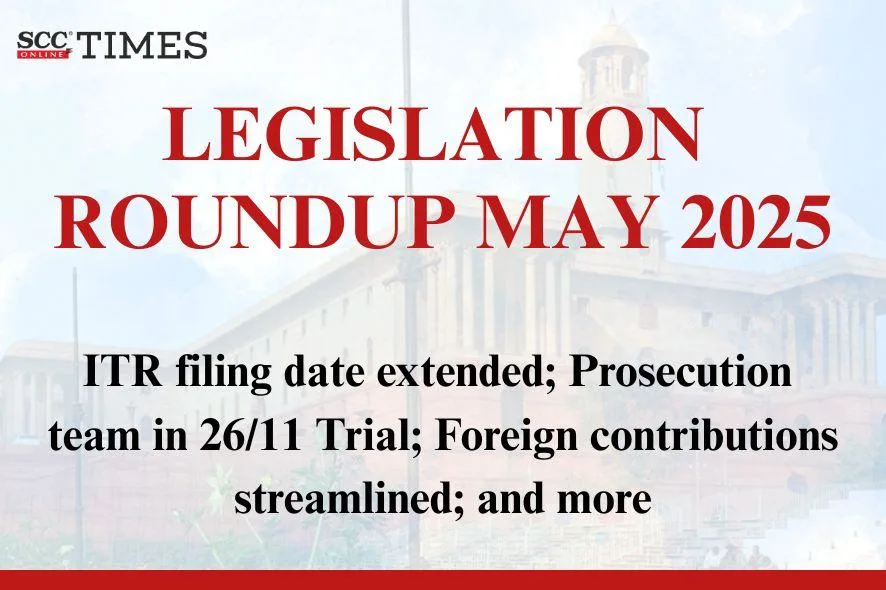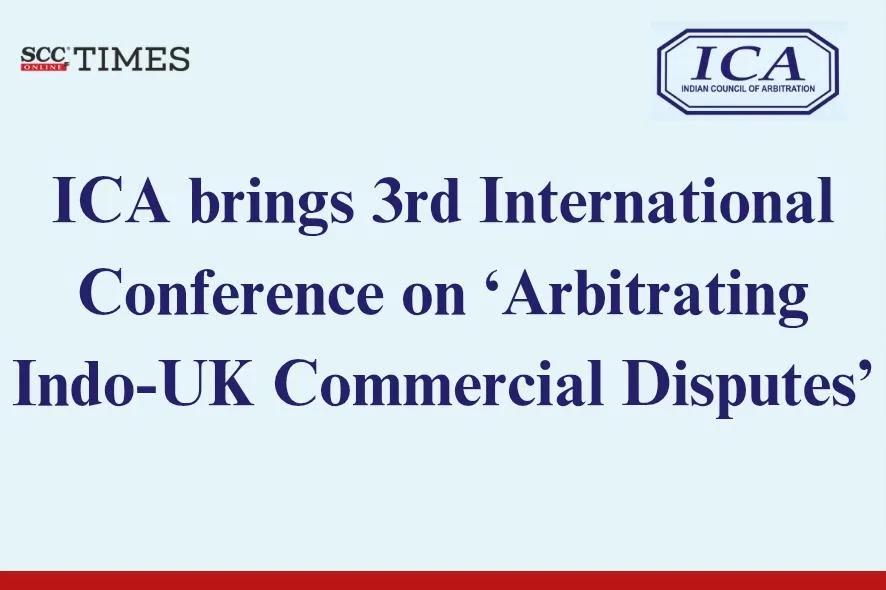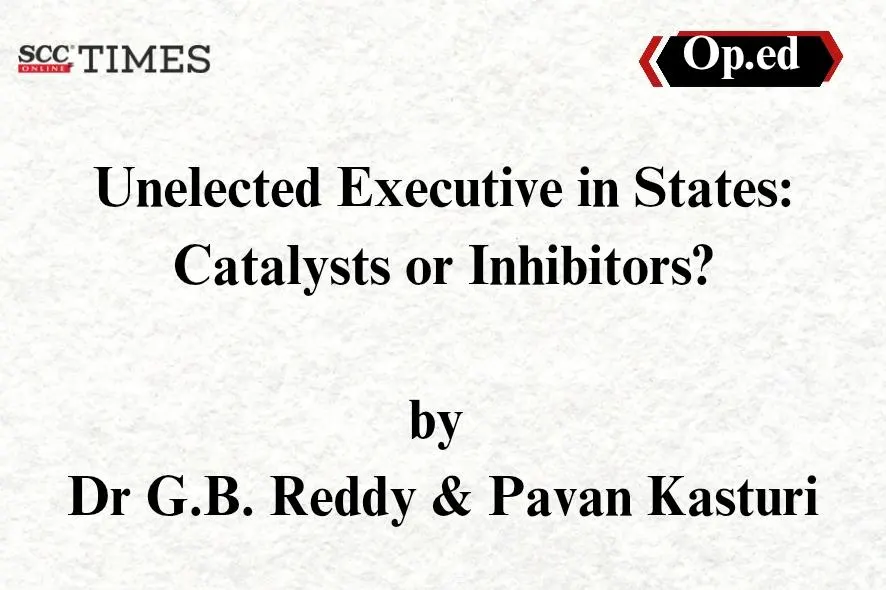Supreme Court: In a criminal appeal by a wife against a decision of the Jharkhand High Court, whereby the question that will a husband, who secures a decree for restitution of conjugal rights, stand absolved of paying maintenance to his wife by virtue of Section 125(4) of the Code of Criminal Procedure, 1973, if his wife refuses to abide by the said decree and return to the matrimonial home, was answered in affirmative, the Division Bench of Sanjiv Khanna., CJI and Sanjay Kumar, J. allowing the appeal set aside the impugned decision after considering all the relevant facts and circumstance. The Bench held that the wife had more than sufficient reason to stay away from the society of her husband, and her refusal to live with him, notwithstanding the passing of a decree for restitution of conjugal rights, therefore, could not have been held against her. In consequence, the disqualification under Section 125(4) of the CrPC was not attracted and the High Court erred grievously in applying the same and holding that wife was not entitled to the maintenance granted to her by the Family Court.
Background
After marriage in 2014, the wife started living at her parental home in 2015. The husband invoked Section 9 of the Hindu Marriage Act, 1955, for restitution of conjugal rights. The husband’s suit for restitution of conjugal rights was decreed, with a direction to ensure the respect and dignity of his wife and to see that her conditions with regard to cooking and toilet facilities were complied with. However, the wife did not abide by this decree.
Thereafter, the wife lodged a complaint under Section 498A of the Penal Code, 1860 (‘IPC’) against the husband and resultantly, he was sent to prison and was consequently suspended from service for some time. A suit for maintenance under Section 125 of the Code of Criminal Procedure, 1973 (‘CrPC’) was instituted. Allowing the same, the husband was directed to pay 10,000/- per month to his wife. In the revision application against the said order, the High Court noted that there was a specific finding that the wife had withdrawn from her husband’s society without reasonable excuse and that she had not returned to the matrimonial home despite the said decree for restitution of conjugal rights, which she had not even chosen to challenge by way of appeal and held that Section 125(4) of the CrPC would come to husband’s aid and, in consequence, the wife would not be entitled to maintenance.
Analysis and Decision
The Court noted that in 41st Report, the Law Commission of India, while adverting to Section 488 of the Code of Criminal Procedure, 1898, observed that the primary justification for placing provisions relating to maintenance was aimed at preventing starvation and vagrancy, leading to commission of crime; and in Chaturbhuj v. Sita Bai (2008) 2 SCC 316, it was observed that the object of maintenance proceedings is not to punish a person for his neglect but to prevent the vagrancy and destitution of a deserted wife, by providing her food, clothing and shelter by a speedy remedy.
Regarding the question at hand, the Court noted that several High Courts have taken a stand, but the views are inconsistent. The Court also referred to views taken by this Court in Kirtikant D. Vadodaria v. State of Gujarat (1996) 4 SCC 479 and Amrita Singh v. Ratan Singh (2018) 17 SCC 737, that mere ‘failure’ of the wife to live with her husband would not be sufficient to disentitle her from receiving maintenance from him, especially as the crucial word carefully chosen in the relevant provision is ‘refusal’; and where the wife was treated with cruelty and subjected to persistent demands for dowry, resulting in her being ousted from the matrimonial house, whereupon she was compelled to file a criminal complaint under Section 498A IPC ending in the conviction of the husband and his father, she was held to have reasonable grounds not to join the husband, thereby entitling her to maintenance.
The Court said that the preponderance of judicial thought weighs in favour of upholding the wife’s right to maintenance under Section 125 of the CrPC and the mere passing of a decree for restitution of conjugal rights at the husband’s behest and non-compliance therewith by the wife would not, by itself, be sufficient to attract the disqualification under Section 125(4) of the CrPC. The Court said that it would depend on the facts of the individual case, and it would have to be decided, on the strength of the material and evidence available, whether the wife still had valid and sufficient reason to refuse to live with her husband, despite such a decree. There can be no hard and fast rule in this regard, and it must invariably depend on the distinctive facts and circumstances obtaining in each particular case.
“In any event, a decree for restitution of conjugal rights secured by a husband coupled with non-compliance therewith by the wife would not be determinative straightaway either of her right to maintenance or the applicability of the disqualification under Section 125(4) of the CrPC.”
Further, the Court outrightly rejected the contention that that the findings in the judgment for restitution of conjugal rights by the Family Court, being a Civil Court, would be binding on the Court dealing with the petition under Section 125 of the CrPC, as they are to be treated as criminal proceedings. In this reference, the Court relied on Shanti Kumar Panda v. Shakuntala Devi (2004) 1 SCC 438, wherein it was held that a decision by a Criminal Court would not bind the Civil Court while a decision by the Civil Court would bind the Criminal Court. Saying that, the judgments passed on merits in civil proceedings have been accepted as sufficient cause to discharge or acquit a person facing prosecution on the same grounds and that this dictum is applied especially in cases where civil adjudication proceedings, like in tax cases, lead to initiation of prosecution by the authorities, the Court said that such cases are, however, different as there is a direct connect between the civil proceedings and the prosecution which is launched. However, the Court opined that the said principle cannot be applied per se to proceedings for maintenance under Section 125 of the CrPC by relying upon a judgment passed by a Civil Court on an application for restitution of conjugal rights. Further, the Court added that the two proceedings are altogether independent and are not directly or even indirectly connected, in the sense that proceedings under Section 125 of the CrPC do not arise from proceedings for restitution of conjugal rights.
Hence, in the matter at hand, the Court said that, the findings in the proceedings for restitution of conjugal rights, which were partly uncontested as the wife did not appear before the Family Court to adduce evidence or advance her case after filing her written statement, did not clinch the issue and the High Court ought not to have given such undue weightage to the said judgment and the findings therein.
The Court also highlighted that certain crucial factor as to no cross-examination of wife in the Section 125 of the CrPC proceedings; that she was fully dependent on her brother; that during her abortion in January 2015, the husband’s admission that he did not bear the expenditure for her treatment and her unrebutted assertion that he did not take her to the hospital or even come from Ranchi to see her; and that she was not allowed to use the toilet in the house or avail proper facilities to cook food, were overlooked and these were clear indicia of the pain and mental cruelty meted out to her.
Further, the Court applied the standard laid down in Parveen Mehta v. Inderjit Mehta (2002) 5 SCC 706, that in a case of mental cruelty, the approach should be to take the cumulative effect of the facts and circumstances emerging from the evidence on record and then draw a fair inference whether the spouse has been subjected to mental cruelty due to the conduct of the other. On application of the said standard, the Court said that the husband’s conduct in completely ignoring his wife, after she suffered the miscarriage of their child added to her suffering due to the ill-treatment in her matrimonial home. Therefore, the Court opined that she had just cause to not return to her matrimonial home, despite the restitution decree.
Additionally, the Court noted that the restitution decree was passed on 23-04-2022, there was no attempt made at reconciliation after 2017 and neither the execution of the decree under Order XXI Rule 32 of the CPC was sought nor did the husband seek a decree of divorce under Section 13(1A)(ii) of the Hindu Marriage Act, 1955.
Thus, allowing the appeal, the Court directed the husband to pay maintenance of Rs. 10,000/- per month his wife on or before the 10th day of each calendar month. Such maintenance would be payable from the date of filing of the maintenance application, i.e., 03-08-2019. Arrears of the maintenance shall be paid in three equal instalments, i.e., the first instalment by 30-04-2025, the second instalment by 31-08-2025 and the third and final instalment by 31-12-2025.
CASE DETAILS
|
Citation: Appellants : Respondents : |
Advocates who appeared in this case For Petitioner(s): For Respondent(s): |
CORAM :















“The closer the collapse of an Empire, the crazier its laws.” “When it has already been proven in the lower court that she has no reason to live separately, yet she still wishes to do so, and is not entitled to alimony under Section 125 of the CrPC, how did Your Lordship arrive at this judgment? Was it solely because she asserted her desire to live separately?
Please correct me if I’v wrongly understood the judgment.